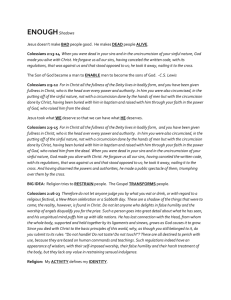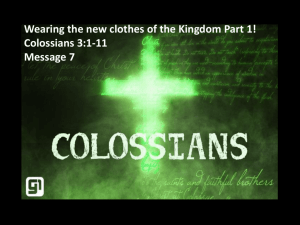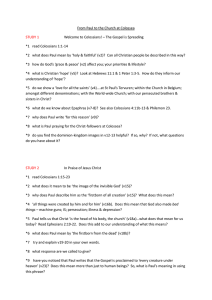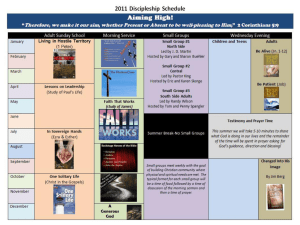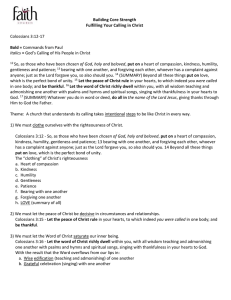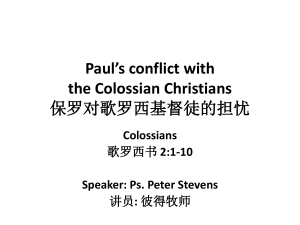Where do we find wisdom for life in a broken world?
advertisement
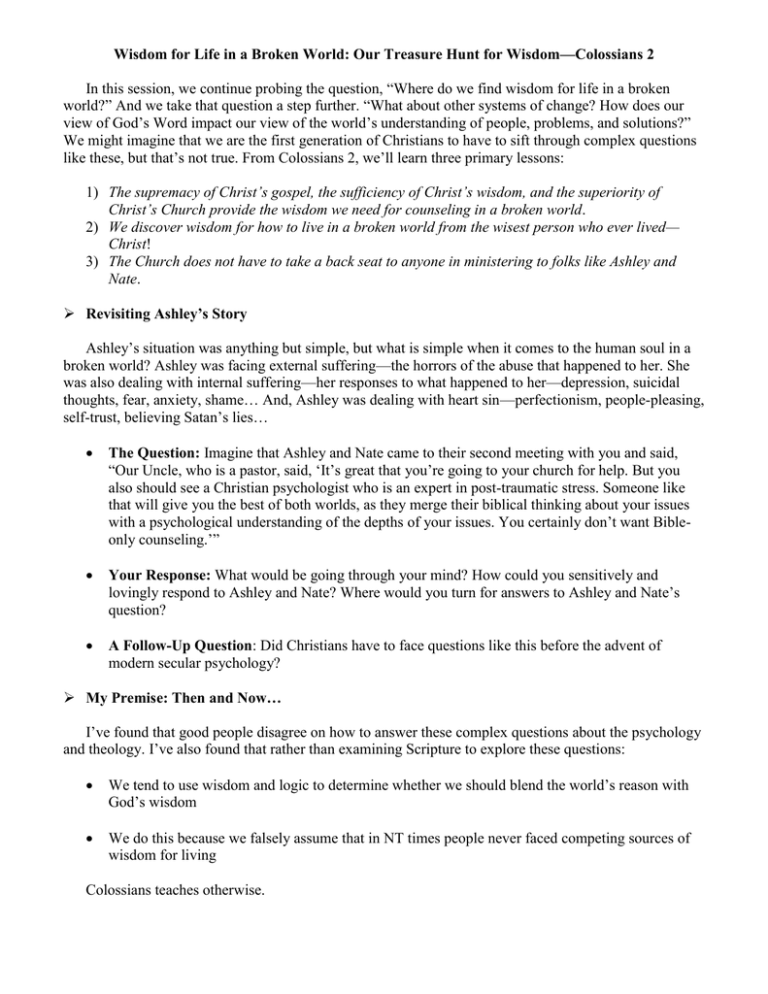
Wisdom for Life in a Broken World: Our Treasure Hunt for Wisdom—Colossians 2 In this session, we continue probing the question, “Where do we find wisdom for life in a broken world?” And we take that question a step further. “What about other systems of change? How does our view of God’s Word impact our view of the world’s understanding of people, problems, and solutions?” We might imagine that we are the first generation of Christians to have to sift through complex questions like these, but that’s not true. From Colossians 2, we’ll learn three primary lessons: 1) The supremacy of Christ’s gospel, the sufficiency of Christ’s wisdom, and the superiority of Christ’s Church provide the wisdom we need for counseling in a broken world. 2) We discover wisdom for how to live in a broken world from the wisest person who ever lived— Christ! 3) The Church does not have to take a back seat to anyone in ministering to folks like Ashley and Nate. Revisiting Ashley’s Story Ashley’s situation was anything but simple, but what is simple when it comes to the human soul in a broken world? Ashley was facing external suffering—the horrors of the abuse that happened to her. She was also dealing with internal suffering—her responses to what happened to her—depression, suicidal thoughts, fear, anxiety, shame… And, Ashley was dealing with heart sin—perfectionism, people-pleasing, self-trust, believing Satan’s lies… The Question: Imagine that Ashley and Nate came to their second meeting with you and said, “Our Uncle, who is a pastor, said, ‘It’s great that you’re going to your church for help. But you also should see a Christian psychologist who is an expert in post-traumatic stress. Someone like that will give you the best of both worlds, as they merge their biblical thinking about your issues with a psychological understanding of the depths of your issues. You certainly don’t want Bibleonly counseling.’” Your Response: What would be going through your mind? How could you sensitively and lovingly respond to Ashley and Nate? Where would you turn for answers to Ashley and Nate’s question? A Follow-Up Question: Did Christians have to face questions like this before the advent of modern secular psychology? My Premise: Then and Now… I’ve found that good people disagree on how to answer these complex questions about the psychology and theology. I’ve also found that rather than examining Scripture to explore these questions: We tend to use wisdom and logic to determine whether we should blend the world’s reason with God’s wisdom We do this because we falsely assume that in NT times people never faced competing sources of wisdom for living Colossians teaches otherwise. 2 I. A Shepherd’s Concern for His Sheep The Issues the Colossians Were Facing Recall the issues that motivated Paul to write to the Colossians from his prison cell. The Christians in Colosse were facing suffering—condemnation from Satan (Colossians 1:22), judgment by others (Colossians 2:16), interpersonal grievances and struggles (Colossians 3:13, 15), and family discord (Colossians 3:19-21). They were also battling sinful temptations—sexual immorality, impurity, lust, evil desires, greed, anger, rage, malice, slander, and lying (Col. 3:5-9). In today’s world, these are the type of life issues that cause us to grab our smartphone and schedule a counseling appointment. In Paul’s world, these were also the type of life issues that caused people to visit first century soul experts.i Paul forged Colossians in the heart of active controversy about which source of wisdom could address perplexing life issues.ii Like today, first century Christians engaged in heated debates about where they could find wisdom for life in a broken world.iii Paul, His Sheep, and the Great Shepherd Paul steps onto the debate platform in Colossians to point people to Christ’s all-sufficient wisdom because in Him “are hidden all the treasures of wisdom and knowledge” (Colossians 2:3). What’s the context for Paul’s reference to Christ’s wisdom? It’s the same context that brings folks to counseling sessions today: relationship with God—that they would be mature in Christ, relationships with one another—that they would be united in love, and inner life issues—that they would be encouraged in heart (Colossians 1:28; 2:2). What’s the motivation behind Paul’s emphasis on Christ’s all-sufficient wisdom? He’s concern that his flock will turn to the world’s pseudo-wisdom instead of to the wisdom of the Word. “I tell you this so that no one may deceive you by fine-sounding human reasonings” (Colossians 2:4). “See to it that no one takes you captive through hollow and deceptive philosophy, which depends on human tradition and the basic principles of this world rather than on Christ” (Colossians 2:8). A. Ancient Philosophy Equals Modern Psychology Here’s the word that confuses us—philosophy. We hear that word and we assume it means abstract, esoteric, academic reasoning about theoretical issues unrelated to life. That’s not how Paul uses the word or how Paul’s readers understood the word philosophy. 1. Paul’s Caution in Context “Philosophy” Philosophy in Paul’s day focused on diagnosing and healing diseases of the soul produced by false beliefs and mishandled desires that were cured by expert talk based upon a systematic theory of human wellbeing.iv We can summarize our thinking so far like this: A Tweet to Remember: Clearly ancient philosophy and modern psychology cover the same terrain. 3 Paul’s first century caution to beware of deceptive philosophy is also Paul’s twenty-first century caution for us to beware of deceptive psychology that depends on human reason and not on Christ’s allsufficient wisdom.v Expert Talkers and Syncretism Who were these philosopher/counselors of Paul’s day? Don’t take my word for it. Let’s listen to some commentators, many of whom wrote before the modern debate between biblical counselors and Christian integrative counselors. These expert talkers of Paul’s day claimed they were elite thinkers who possessed superior insight necessary for overcoming suffering and sin. They said that without their advanced teaching, progressive wisdom, and special knowledge, no one could handle life maturely (F.F. Bruce).vi Paul’s shepherd’s heart was angered by such elitism. Three times in Colossians 1:28 he repeats that Christ’s wisdom is for everyone. “We proclaim him, admonishing everyone and teaching everyone with all wisdom, so that we may present everyone perfect in Christ” (Colossians 1:28). His message was that “there is no part of Christian teaching that is to be reserved for a spiritual elite. All the truth of God is for all the people of God.”vii William Hendricksen paraphrases the message the counselors of Paul’s day were sharing with the Colossians. “Are you putting up a tremendous but losing battle against the temptations of your evil nature? We can help you. Faith in Christ, though fine as far as it goes, is not sufficient, for Christ is not a complete Savior.”viii F. F. Bruce describes it as a “syncretism” (blending, mixing) of Jewish religious ritual with Hellenistic philosophy of living that was fine with adding in elements of Christianity.ix Paul’s shepherd’s concern was alarmed by this message of “Christ + human wisdom.” A Tweet to Remember: First century counselors used talk therapy to teach how to live the good life out of a good heart for the good of society.x Though their models of the good life and their theories about how to achieve it varied (just as today we have hundreds of counseling models and theories), these first-century soul physicians all sought to help people to live a flourishing life where they could fulfill their unique purpose by making a meaningful contribution to society. And they sought to accomplish this goal by talk therapy—using human reasoning, dialogue, discourse, instruction, confrontation, and reproof to change their counselee’s beliefs and behaviors.xi B. Beware!: Colossians 2:4, 8 What we’ve shared provides the historical context behind Paul’s warnings in Colossians 2:4, 8. “I tell you this so that no one may deceive you by fine-sounding human reasonings” (Colossians 2:4). “See to it that no one takes you captive through hollow and deceptive philosophy, which depends on human tradition and the basic principles of this world rather than on Christ” (Colossians 2:8). Ever since Genesis 3, we have faced two competing sources of wisdom about people, problems, and solutions—and Paul provides wise counsel on how to respond. In fact, Paul’s counsel about counseling in Colossians 2:4 would have been excellent guidance for Eve. 4 1. “Fine-Sounding Reasonings” Paul begins by warning the Colossians and us about “fine-sounding reasonings.” This phrase pictures these first-century counselors as communicators, teachers, and debaters who wooed and wowed people with style that lacked substance. They deceived or beguiled people through false reasoning—human reason apart from divine revelation. They had an appealing sales pitch with an appalling product. 2. Beware: Don’t Be Caught Off Guard Paul is so concerned that he tells the Colossians to “Beware!” He’s saying, “Wake up! Pay attention. Danger! Danger! Don’t be duped or caught off guard.” That would have been excellent counsel for Adam when he failed to guard the garden. 3. Don’t Be Taken Captive Paul uses military language when he warns the Colossians against being taken captive—carried away as booty in the spoils of war. Counseling is spiritual warfare and secular psychology is the enemy’s weapon of choice to take us captive to his lies. 4. Hollow and Deceptive Philosophy Paul describes the weapons of warfare as hollow philosophy—human reasonings that are empty, proud, and lacking content and worth for real-life change. They’re also deceptive—designed to trick or con, to entice through a pleasant illusion. 5. Human Tradition/Basic Principles of the World Paul’s so fiercely against such counsel because it is according to human tradition and the basic principles of the world and not according to Christ. This is once again military language—“basic principles” was used of military units organized for warfare in columns. The term became used for foundational systems of belief upon which people patterned their lives. Paul’s saying: “Don’t be duped by the enemy or your allegiance will be stolen by sin-distorted human reasoning used to try to cure souls.” “Don’t even think of following people who are separated from the life of God because they can only teach you how to live life separated from God!” As I reflect what I’ve just shared, I’m picturing committed Christians who build their approach to counseling with some blending of secular psychology theory with biblical understandings of people, problems, and solutions. I imagine them saying, “Bob, what are you writing! When did your ministry start focusing on the negatives and ‘againstness’? When did you become so ‘anti-psychology’?” I would respond, “Don’t shoot the messenger—me! I’m simply explaining and applying Colossians 2:1-8 in its historical context. Paul, inspired by the Holy Spirit, was sending the Colossians and us a pastoral letter of concern about blending Christ’s wisdom for living with human wisdom for living. I would say to my Christian Integrative Counseling friends, “If you study the text and find a different meaning and application, let’s talk. If you study the text and come to a similar conclusion, then perhaps it is time for further reflection about the wisdom of building a Christian approach to people-helping that blends Christ’s wisdom and the world’s ‘wisdom.’” 5 In our biblical counseling world, we’ve used Colossians 2:4 and 2:8 to support our convictions about the sufficiency of Scripture and about the dangers of integrating secular theory with biblical theology. But I’m not sure we’ve always used the full weight, the full force of Paul’s words. We have not typically understood or emphasized: The historical and cultural reality that ancient philosophy and modern psychology cover the same terrain. The contextual reality that the Colossians were facing the same issues that send us to counselors today. The contextual reality that the Colossians were faced with competing counseling forces clamoring for their loyalty. So, our question is: How does Paul’s caution in historical and biblical context shape our conversations with those who suggest that it is biblical to blend a secular and a scriptural view of people, problems, and solutions? II. The Supremacy of Christ and the Sufficiency of Christ’s Gospel of Grace My ministry has never focused on what I’m against, or being anti-this or anti-that. Neither is Paul’s ministry. Yes, he’s not shy about expressing pastoral concern when his flock is tempted to learn how to live life from anyone but the Creator and Sustainer of life—the One who is the Way, the Truth, and the Life. However, most of Paul’s focus in Colossians is decidedly positive. Colossians 1 is all about the supremacy of Christ and the sufficiency of Christ’s gospel of grace for relational living now and forever. Colossians 2 is all about Christ’s all-sufficient wisdom. In your notes, I summarized Paul’s counseling model in Colossians 2 like this: Paul’s Counseling Model (A Little Longer Than a Tweet): Christ embodies all-sufficient wisdom to live the good life (life abundant and eternal) out of a good heart (a renewed heart) for the good of society (loving God and others) for the glory of God. A. The Wisest Person Who Ever Lived: Colossians 2:2-3 Paul writes Colossians 2 to help the Colossians to ponder, “Who is the wisest person who ever lived?” Not just the most brilliant person who ever lived (though that would also be Christ) who might give the Colossians information. But the wisest person who ever lived who offers the Colossians transformation. Paul doesn’t just want the Colossians to know about the wisest person who ever lived; he wants them to know Him. He wants them, and us, to have the full riches of complete understanding that we might know Christ—in whom are hidden all the treasures of wisdom and knowledge (Colossians 2:2-3). Paul’s excited. He says, “Let me tell you about the truly purpose-driven church:” Truly Purpose-Driven Church: It’s a community of believers on a search and discovery mission—treasure hunt—to find/know the greatest treasure ever—Christ Who Is Wisdom It’s not so much that Paul is “anti-psychology.” It’s that Paul is “pro-Christ”! We can unite Colossians 1 with Colossians 2:1-9 with this summary or tweet to remember: A Tweet to Remember: Strangely, we seem prepared to learn how to live from almost anyone but Christ—Colossians 2:1-9 6 B. Jesus Knows People: John 2-4 Paul’s fascination with Christ reminds me of the Apostle John’s captivation with Christ. At the end of John 2 we find a “textual marker”—like a blazing, blinking neon light demanding our attention. That neon light proclaims, “Jesus Knows People!” Everyone was enamored with Jesus because of His many miraculous signs (John 2:23). But Jesus would not entrust Himself to the fickle crowd because “he knew all men. He did not need man’s testimony about man, for he knew what was in a man” (John 2:24-25). Jesus knows people intensively and extensively—He knows everything about everybody. He wasn’t googling the latest pop psychology book at Amazon because Jesus knows people. John 3-4 seems to have been penned, in part, to address folks who might have been thinking, “Yeah, right, John. Prove it. Prove that Jesus knows everything about everybody.” In those two chapters Jesus counsels the two most different people imaginable in John’s day—Nicodemus and the woman at the well. Consider their differences: Nicodemus, the Jewish, male, self-righteous, insider, religious leader and the nameless, Samaritan, female, unrighteous, outcast, irreligious follower. Trace Jesus’ soul care ministry to each of these unique individuals and you’ll see many “methods” but one message communicated in numerous person-specific ways. He meets both where they are, but leaves neither where they were. To Nicodemus the Pharisee, Jesus speaks of the kingdom of God, being born again, of Moses, and of God’s love. To the Samaritan woman at the well, Jesus connects through their common humanity—they thirst. Then He speaks to her of living water, of her husband who is not her husband, and of worship in spirit and in truth. Rightly so, it is the nameless Samaritan woman who rightly names Christ. Her words are like the second bookend around these chapters. “He told me everything I ever did” (John 4:39). That’s simply another way of saying Jesus Knows People! Jesus is the Wonderful Counselor. He’s the ultimate Physician of the soul. His personal ministry with Nicodemus and the Samaritan woman depict His understanding of people—thoroughly, His diagnosis of root problems—precisely, and His prescription of soul-u-tions—perfectly. C. Impact the Babylonians, Don’t Spoil the Egyptians It is to this Wonderful Counselor that Paul points us when he exalts Christ as the only One in whom are hidden all the treasures of wisdom and knowledge. To understand Paul’s point, we have to understand the biblical portrayal of wisdom. Throughout the Bible: Hocmah/Sophia: Wisdom and folly relate to the whole person living a godly or ungodly life in every area of relating, thinking, choosing, doing, and feeling—not “Sunday living” but godliness 24/7.xii Studying the Old Testament’s primary word for wisdom (hocmah) and the primary New Testament word for wisdom (sophia) reveals a very practical definition: A Tweet to Remember: God has given us in His Son, His Word, His Spirit, and His Church all things we need to live sanely in this insane world in light of the world to come. A Tweet to Remember: God has given us in His Son, His Word, His Spirit, and His Church all we need to move toward spiritual, relational, mental, behavioral, and emotional healing and health. 2. “Fine Just for ‘Spiritual Matters’?”: Colossians 1:18; 2:3, 6, 23; 3:8, 18-19 This definition of biblical wisdom is important because we’re often told that pastoral counseling, one- 7 another ministry, and biblical counseling are fine for “spiritual matters”—for our eternal relationship with God. However, we’re told that how we relate to one another, how we handle our mental and emotional life—that’s primarily the domain of psychology, not the domain of the Bible. That’s like saying some things are not the domain of Christ. That’s in direct opposition to what Paul has communicated throughout Colossians. In everything Christ has the supremacy (Colossians 1:18) and for everything we have Christ’s sufficiency (Colossians 2:3). It is an unbiblical secular-sacred dichotomy to proclaim that Christ is supreme over “spiritual matters” but not over daily life issues of relating, thinking, choosing, behaving, and feeling. Those are spiritual matters—everything is spiritual—in relationship to God.xiii This is certainly Paul’s view as he encourages us to apply Christ’s wisdom to our daily lives and relationships. “Just as you received Christ Jesus as Lord, continue to live in him” (Colossians 2:6, emphasis added). Paul then applies Christ’s wisdom for daily living to restraining sensual indulgence (Colossians 2:23). Think about that. When most people think of what to include in the category of “spiritual,” the last item that would enter their mind is the physical body and sexuality. Paul says, “Everything, including our sexuality, our sensuality, is under the Lordship of Christ and is redeemable by grace—salvation grace and sanctification grace.” Paul then urges us to apply Christ’s wisdom to our emotional life—how we deal with anger, rage, and malice (Colossians 3:8). When most people think of what to include in the category of “spiritual,” the second-to-last item they would think of is our emotions and feelings. Paul says, “Everything, including our emotionality, our ‘emotional intelligence,’ is under the Lordship of Christ and is redeemable by grace—salvation grace and sanctification grace.” Paul then teaches us to apply Christ’s wisdom to our relational struggles—to husbands who are harsh and fathers who embitter their children through discouragement. Abusive husbands and fathers—is that only the domain of the secular social worker, or is even that under the domain of the Lordship and wisdom of Christ? 3. Spoiling the Egyptians: Exodus 3:22; 12:36 You may be wondering about the header to this section: Impact the Babylonians, Don’t Spoil the Egyptians. In the counseling world, the phrase “spoil the Egyptians” has been frequently used to picture the idea of blending the best of what the world has to offer with the best Christ has to offer. It comes from an incident in Exodus where, “Every woman is to ask her neighbor and any woman living in her house for articles of silver and gold and for clothing, which you will put on your sons and daughters. And so you will plunder the Egyptians” (Exodus 3:22; see also Exodus 12:36). Connecting that verse to counseling theory and practice involves an inaccurate analogy and an incorrect application. In Exodus, God’s people were leaving a pagan nation and were told to spoil them, not of their wisdom, but of their material possessions. 4. Impacting the Babylonians: Colossians 4:3-6 The more apt analogy for counseling would be Daniel in Babylon. Here we have a spiritual analogy of God’s people entering a pagan nation and impacting it with God’s wisdom. Thus, Paul’s analogy in Colossians 2 could be called “Impact the Babylonians.” As the church, we are to be salt and light taking Christ’s all-sufficient wisdom into our hurting, broken, and confused world. This is exactly Paul’s prayer request for himself: “And pray for us, too, that God may open a door for our message, so that we may proclaim the mystery of Christ, for which I am in chains. Pray that I may proclaim it clearly as I should” (Colossians 4:3-4). 8 And it is Paul’s prayer for the Colossians and for us that we would impact the Babylonians—impact our world for Christ with Christ’s wisdom. “Be wise in the way you act toward outsiders; make the most of every opportunity. Let your conversations be always full of grace, seasoned with salt, so that you may know how to answer everyone” (Colossians 4:5-6). What a beautiful portrait of gospel conversations. The Colossians were surrounded by floundering people who were listening to the “wisdom of the world,” to the philosopher-counselors of their day. Paul said that such worldly counselors lacked wisdom and any value in restraining sensual indulgence. Into this confused world, Paul didn’t say, “Spoil the Egyptians.” Instead, he said, “The Egyptians are spoiled—their so-called wisdom is folly! Impact the Babylonians—pray for wisdom to share gospel conversations that are full of Christ’s grace so that you will wisdom for fellow believers and for unbelievers as they face life in a broken world.” PDQ: How does God powerfully use His Church, when, instead of trying to “blend worldly wisdom with Christ’s wisdom,” we demonstrate the robust, rich, relational, relevant wisdom of God’s Word for daily living? III. Don’t Take a Back Seat to Anyone! A. The Superiority of the Body of Christ: Colossians 2:16-20; 3:1-14 with 3:15-16 During the four years that I was in seminary, I worked at the Otis R. Bowen Center for Human Services (ORBC). It was a five-county, government-run inpatient unit for individuals struggling with life issues. The ORBC tried desperately to replicate a family setting with a community feel. Patients and staff shared meals together, took walks together, played games together, laughed together, and cried together. We had group therapy, individual counseling; art therapy, activity therapy, and off-site “field trips.” We provided every patient a primary care team focused on their individualize treatment—a psych nurse, psychiatrist, psychologist, social worker, mental health worker, and dietician. Everyone received the best care the world could offer 24/7. The ORBC desperately tried to replicate…the church. While the clients at the ORBC may not have always verbalized it, they were all seeking an answer to life’s seventh ultimate question that we discussed last session, “Where can I find a place to believe, belong, and become?” The ORBC attempted to be that place. They wanted to be a place where struggling people felt accepted, loved, and cared for—a place to belong. They also wanted to be a place where struggling people could grow, overcome their struggles, and mature—a place to become. What the ORBC was trying to be is exactly what God calls the church to be—a place to belong and become. The world is trying to replicate what we have, so why in the world are we trying so hard to replicate the world? This is sad biblically given that the Word of God, the Spirit of God, and the people of God provide us with all that we need for life in a broken world. It is also sad practically given the fact that the ORBC had an astronomically high rate of recidivism. That is, even after the best care the world could offer, patients returned repeatedly because their problems in living were never resolved. Why in the world are we sending our people to the world’s empty counterfeit replica of the church? Why? Perhaps because we have forgotten the truth that God has not placed our sanctification in the hands of trained and paid professionals.xiv God’s plan is that everyone in the body of Christ speaks and lives gospel truth in love so that the whole body grows up in Christ. Colossians 1-2 are about confidence in the resources we have in Christ. We’ve explored how to view the Bible—the written Word—with confidence for life. We can have confidence in the supremacy of Christ’s gospel of grace for relational living now and forever. We’ve also explored how to view Christ— 9 the Living Word—with confidence for life. We can have confidence in the sufficiency of Christ’s wisdom for living the good life out of a good heart for the good of society for the glory of God. Paul has one more major message he wants to share with the Colossians. It’s also about confidence— this time confidence in the Body of Christ for equipping one another to grow in Christ. We can have confidence in the superiority of the Body of Christ for helping the whole person to become whole, healthy, and holy in Christ. 1. The Colossian’s Church Community and “Other Competing Communities” Paul doesn’t choose his topic in a vacuum. The Colossians were being told that they needed community in addition to their Christian community. Their community in Christ was being judged as insufficient (Colossians 2:16, 18, 20). There was a long history of this mindset in the Ancient Near East. Philosopher-counselors like Epicurus presented themselves as the only savior—the correct guide of correct speech and deed.xv He invited his pupils-disciples into his “Epicurean Garden” which was an enclosed therapeutic community. “Its members became her new family. And there can be no question as to who the head of this family is: for its members even wear images of Epicurus on their rings and put his portrait on their drinking cups.”xvi Likewise, the Stoic philosopher-counselor invited their disciples into a community where they became life-long members of a family participating in a way of life ordered by reason. Their god was the god within—the god of rational argument and human reason. They saw the commitment to God and divine revelation to be foolish and illogical.xvii There is nothing new under the son. Today the world seeks to cause the Church to feel inferior, communicating that we have to send the “hard cases” to the professionals, to the experts. In exposing this reality, my intent is not to “bash” the professionals, but to raise up the church. For far too long we’ve been sold the lie and bought the propaganda that when the messy issues of life strike a member of our church family, we should hug, pray, and refer. 2. The Colossian’s Call to Be a One-Another Community: Colossians 3:15-16 That’s certainly not Paul’s message to members of the Body of Christ. “Let the peace of Christ rule in your hearts since as members of one body you were called to peace. And be thankful. Let the word of Christ dwell in you richly as you teach and admonish one another with all wisdom…” (Colossians 3:15-16a). We quote these verses often, but frequently out of context. Notice what Paul sandwiches around his encouragement for us to let Christ’s treasure of wisdom richly dwell in us as we engage in the personal ministry of the Word with one-another. On the one side it is deep heart/affection change and mind renewal that leads to lives transformed from sexual immorality, lust, greed, anger, rage, malice, slander, and lying. On the other side it is lasting relational change in how husband and wives, parents and children relate to one another. Where does Paul send people when they need to address counseling issues? To the Church! Where does Paul place his confidence for growth in grace, for progressive sanctification, for deep heart change? To the Body of Christ! And with what resource does Paul arm his flock? The wisdom of the Word of Christ applied first to our lives and then to each other’s lives. Paul says to the Colossians and to us, “When it comes to helping people deal with difficult life issues, don’t take a back seat to anyone!” 10 B. The Résumé of the People of God When we discuss who is equipped to address which types of life issues, part of our struggle is that we typically maintain a shallow definition of the personal ministry of the Word, whether we call it pastoral counseling, one-another ministry, biblical counseling, or gospel-centered counseling. We need a definition of biblical counseling that encompasses all of life. Here’s one such working definition. A Definition of Biblical Counseling that Encompasses All of Life: Christ-centered, churchbased, comprehensive, compassionate, and culturally-informed biblical counseling depends upon the Holy Spirit to relate God’s Word to suffering and sin by speaking and living God’s truth in love to equip people to love God and one another (Matthew 22:35-40). It cultivates conformity to Christ (the whole person becoming whole in Christ—our inner life increasingly reflecting the inner life of Christ) and communion with Christ and the Body of Christ leading to a community of one-another disciple-makers (Matthew 28:18-20). In this definition, the “spiritual stuff” is everything related to who we are as everlasting, embedded, embodied, emotional, volitional, rational, relational, self-aware, social, and spiritual beings.xviii Biblical counseling focuses on everything related to how the whole person deals with all of life—sin and suffering—with the goal of sanctification—growth in Christlikeness. This gospel-centered one-another ministry is what Paul calls the Body of Christ to in Colossians. We can summarize our calling like this: An Ephesians 4:11-16 Tweet to Remember: Christ’s grand plan for His Church is for every member to be a disciple-maker by speaking and living gospel truth to one another in love. PDQs: Prompting Discussion Questions Imagine you are talking with Ashley’s uncle, the pastor. In light of Colossians 2, how could you have a loving (see Colossians 4:3-6) conversation with him where you addressed his concerns about his niece? 11 Endnotes i F.F. Bruce, The Epistles to the Ephesians and Colossians, 167. Edmond Hiebert, An Introduction to the New Testament: Vol. 2—The Pauline Epistles, 222-228. iii William Hendricksen, Philippians, Colossians, and Philemon, 17. iv Martha Nussbaum, The Therapy of Desire, 13-28. v Consider the following historical insights into the connection between ancient philosophy and modern psychology. “The philosophers in ancient Greece took over from religion the moral direction of daily life…. In ancient times the healer of the soul who emerges in advancing cultures is not typically a member of the medical guild. In Greece he belongs instead to the fraternity of philosophers. Socrates was, and wished to be, iastros tes psuches, a healer of the soul. These Greek syllables have been recast to form the word ‘psychiatrist’…. Socrates understood himself as a religious doctor of the soul. It is primarily as the physician of the soul that Socrates regarded himself…. Socrates was a great forerunner of the many who have searched out and sifted the thoughts of men for the healing and well-being of their souls.” John T. McNeil, A History of the Cure of Souls, 17, viii, 20, 41. Epicurus wrote: “Empty is that philosopher’s argument by which no human suffering is therapeutically treated. For just as there is no use in a medical art that does not cast out the sicknesses of bodies, so too there is no use in philosophy, unless it casts out the suffering of the soul.” Quoted in Nussbaum, 13. Speaking of first and second century culture, Thomas Oden writes, “The study of psychology was included in what Clement called philosophy—for it included the study of motivation, perception, passion, habit, and behavior modification.” Thomas Oden, Classical Pastoral Care: Vol. 3—Pastoral Counsel, 228. vi Bruce, 166-167. vii Ibid., 219. viii Hendricksen, 17, emphasis in the original. ix Bruce, 166-167. x Nussbaum, 102-139. xi Ibid., 115-126. These first-century secular counselors even practiced their own brand of secular nouthetic counseling—often using the word nouthetein for their need to share strong reproof and correction to express passionate disapproval of their counselee’s beliefs and conduct. xii Consider passages such as Proverbs 1:2-3, 20-21, 33; 2:11, 16, 21-22; 3:8, 16. xiii See Chapters 6-7 which examines a comprehensive biblical understanding of people. xiv Paul Tripp, Instruments in the Redeemer’s Hands (Phillipsburg, NJ: P&R, 2002), xi. xv Nussbaum, 127-130. xvi Ibid., 119. xvii Ibid., 353-357. xviii See chapters 6-7. ii
